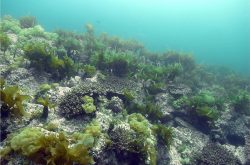
Coral reefs are retreating from equatorial waters and establishing new reefs in more temperate regions, according to new research published July 4 in the journal Marine Ecology Progress Series. The researchers found that the number of young corals on tropical reefs has declined by 85% – and doubled on subtropical reefs – during the last four decades.
As climate change warms the ocean, subtropical environments are becoming more favorable for corals than the equatorial waters where they traditionally thrived. This is allowing drifting coral larvae to settle and grow in new regions. These subtropical reefs could provide refuge for other species challenged by climate change and new opportunities to protect these fledgling ecosystems.
“This study is a great example of the importance of collaborating internationally to assess global trends associated with climate change and project future ecological interactions,” said co-author Jacqueline Padilla-Gamiño, an assistant professor at the University of Washington School of Aquatic and Fishery Sciences. “It also provides a nugget of hope for the resilience and survival of coral reefs.”
The researchers believe that only certain types of coral are able to reach these new locations, based on how far the microscopic larvae can swim and drift on currents before they run out of their limited fat stores. The exact composition of most new reefs is currently unknown, due to the expense of collecting genetic and species diversity data.
Read more at UW News »
